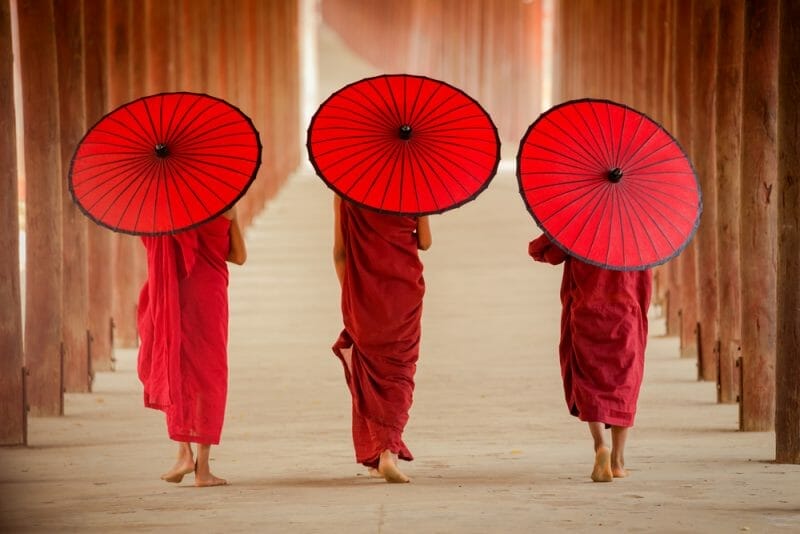For centuries, Buddhist monks have been living an ascetic life. What is the effect of this lifestyle on their health? Let’s examine the life expectancy of monks, which are thought to be longer than those of laypeople.
Buddhist monks are people who devote their lives to the practice of Buddhism. They live in monasteries and temples, observe daily rituals, and spend hours each day meditating.
With a strong belief in karma and reincarnation, Buddhist monks believe it’s best not to accumulate material possessions or be concerned with worldly matters so they can focus on improving themselves spiritually.
This leads them to lead healthier lives by eating less but more healthy food and practicing meditation, leading some scholars to believe their life expectancy may be higher than for non-monks.
Do Buddhist Monks Live Longer?
Buddhist monks live longer than ordinary people, and this is a fact backed up by research. A study was conducted on spiritual gurus in England, Europe, and North America.
It shows that, despite many physical problems, monks live longer and are in general in better health than the average person. Researchers are still trying to figure out the exact reasons for this.
According to the Standardized Mortality Rate (SMR) data, only 10% of monks died younger than the average person, contributing to their longevity.
Most Buddhist monks and nuns were free from complex ailments like cancer and heart disease, the Journal of Religion and Health reported. Thus, their average life expectancy was much higher than that of the general population.
In addition to the one above, here are two other studies that confirm the same finding:
1) https://pubmed.ncbi.nlm.nih.gov/7709920/
2) https://www.jstor.org/stable/4121956?seq=1
However, researchers are still trying to determine the exact reason why Buddhist monks live longer. So far, they have identified two factors. The longevity of monks is believed to be primarily due to their eating habits and lifestyles.
Monks are not an average group and there are many other factors that could be considered in order to get a better understanding of this discrepancy.
Factors such as gender, lifestyle choices (such as eating habits), education level and even genetics can all play into the equation for how long someone will live.
Monks’ life expectancy can also differ based on their location, access to medical care, diet, fitness level, level of physical activity, other lifestyle habits like smoking or drinking alcohol, as well as genetic predispositions.
Buddhist monks are typically thought to live a simple, contemplative life. Buddhists monks have long been admired for their serene and peaceful demeanor.
It is no wonder so many people want to know the secret behind this happiness and longevity.
The truth, however, is that there are a lot of factors at play here: not all Buddhist monks live in monasteries, some have families who they see regularly; as well as the fact that not all Buddhists are vegetarians or teetotalers (though most do).
Do Buddhist monks live longer than the general population? In the past few years research has emerged that suggests some practices of Buddhism can contribute to longevity.
More studies need to be done before we have a clear answer, but it seems likely there is something about being mindful and contemplative in nature that leads to healthier living and increased life expectancy.
There are many accounts of Japanese and Chinese monks living for more than 100 years, and even those who died at 122 years old. ascribe it to rigorous lifestyles.
Also, there have been a number of accounts of people living long past 100 years old due to their meditation practices. Among those example would be Thich Nhat Hanh, who turns 94 in 2021 (born October 11, 1926).
Here’s a Time feature that tells the story of his extraordinary life:
a) https://time.com/5511729/monk-mindfulness-art-of-dying/
Longevity is also found in other religions like Christianity as well through prayer and grace of God.
I found the following research paper to be interesting:
b) https://paa2012.princeton.edu/papers/122836
The monastic lifestyle may help monks live longer compared to average people for several reasons.
Meditation, becoming a vegetarian (if they choose to do so), giving up alcohol and tobacco, and avoiding jobs that demand a great deal of mental exertion (like military service) can all contribute to this. These factors together don’t only make them live longer but healthier.
Specifically, Buddhist monk’s level of meditation may delay their aging process.
The Buddhist monks do spend their time meditating as a form of relaxation which can contribute to lowering blood pressure and heart rate while increasing oxygen levels for better lung capacity.
The monks also follow a strict routine that is thought to improve sleep quality just like doctors tell us all too often how important good sleep hygiene is during adulthood.
Parting Words
Buddhism has not only an extremely calming philosophy but also one that promotes healthy living-eating right and exercising regularly.
Meditation may not be the most important factor in extending the life of a Buddhist monk, but rather lifestyle choices, such as avoiding or moderating certain physical activities, certain diets, and general attitudes and behaviors.
Monks take vows to abstain from marriage, desire, laziness, anger, lies, stealing anything at all. Genetically and through meditation they learn to control their own bodies and minds.
They don’t have to worry about the ego, attachments, or resistance to change and conflicts with other people so they’ll be better able to pursue a pure life of compassion which leads them down the path to enlightenment.


Awesome article, Lida. Thank you!
John, I am so glad you enjoyed the article on my site. Thanks for stopping by!